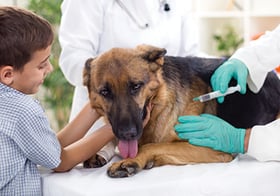As a dog owner, you hear a lot about vaccinations and how your four-legged friend has to have them. But what are vaccinations? And what vaccinations should your dog have?
Simply put, vaccinations are given to protect your pet against disease. During vaccination, a modified bacteria, parasite or virus is administered to your pet by injection or intra-nasally. The vaccination triggers an immune response within your pet’s body to protection against a specific disease.
It is important to remember that not all vaccines are 100% effective; a vaccinated pet may not develop adequate immunity and can become ill. However, the benefits of vaccination far outweigh the risks.
The most commonly administered core vaccine in dogs is typically given as a single injection which contains vaccine against canine distemper, adenovirus, parainfluenza, and parvovirus.
According to the 2011 guidelines developed by the American Animal Hospital Association Canine Vaccination Task Force, dog vaccines can be divided into those that are essential (Core vaccines) and nonessential (Noncore vaccines).
Here is a breakdown of what the vaccines are and what they protect against:
Distemper
Infection with this virus can cause respiratory and gastrointestinal illness in the early stages and progress to neurologic disease. Many dogs who are infected may recover from the illness but may be left with long-term neurologic side effects. This disease is highly contagious between dogs.
Parvovirus
Infection with this virus causes severe vomiting and diarrhea as well as bone marrow problems. Infection can be deadly if left untreated and is highly contagious between dogs.
Adenovirus
Vaccination against adenovirus provides protection against canine infectious hepatitis (liver disease) as well as respiratory illness that can also sometimes be involved in the development of “kennel cough”.
Parainfluenza
This is a viral infection which affect the respiratory system and may be involved in the development of “kennel cough”.
Rabies is given as a single vaccine and is considered a core vaccine (required by law in many areas). The rabies virus is carried by warm blooded mammals and infection with the virus can cause progressive neurologic disease which can be fatal to all mammals, including humans.
The need for other, noncore vaccines will be determined by where you live and what your dog’s lifestyle and potential risk of exposure is. These include:
Leptospirosis
This disease is caused by a bacterial infection and is most prevalent in moist climates. It can result in damage to the liver and/or the kidneys and severe infection can lead to organ failure and respiratory disease.
Influenza
Infection with influenza causes severe upper respiratory signs similar to the flu in people. Dogs that are not treated can go on to develop pneumonia and, in some cases, the infection can lead to death.
Bordetella
This is a bacterial respiratory infection commonly referred to as “kennel cough”. The vaccine and is typically given to lessen the risk of upper respiratory infection in dogs while boarding or those who are frequently exposed to other dogs (e.g., dog shows, dog parks).
Lyme disease
Caused by a bacterial infection transmitted by ticks, vaccination against Lyme disease is recommended for pets who live in or travel to areas where there is a high incidence of the disease.
The recommended vaccines for your dog as well as how often they are needed will vary. As always, feel free to discuss any questions or concerns that you have regarding your pets vaccines with your family veterinarian.





